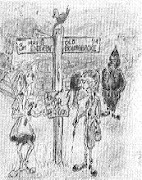
Directed by Edgar G Ulmer; written by Martin Goldsmith; starring Tom Neal (Roberts) and Ann Savage (Vera).
SPOILERS - it's difficult to write about films and books without revealing things you might prefer not to know.
Detour is a film to which many superlatives have attached themselves: 'greatest B-movie'; 'greatest film noir'; 'the cheapest really good film to come out of Hollywood'; 'the most despairing of all B-pictures'. Certainly this 'king of the cults' is no barrel of laughs.
It's got all the hallmarks of classic noir: flashback structure, voice-over narration, hard-boiled dialogue, moody, expressionist photography, femme fatale, victimised hero, a malevolent fate dragging all down to a tragic end.
The story
Roberts is a classically trained pianist eking out a living in a New York bar, where his girlfriend, Sue, also works as a singer. After she leaves to try her luck in Hollywood, Roberts follows, hitch-hiking across country. He is picked up by a flashily generous guy, Haskell, who eventually falls out of the parked car, hits his head on a rock and dies. Roberts, suddenly afraid that he might be suspected of murder, hides the body, and then steals the man's money, car and identity.
Before long he himself gives a ride to a woman, a charmless piece called Vera, who turns out to know the real Haskell, and promptly starts to blackmail Roberts. she goes on to hatch a plot whereby Roberts will use his impersonation to get hold of Haskell's late father's estate.
Another twist of fate leads to Vera's accidental death, again bearing the look of murder, and Roberts goes on the run. With anti-climactic inevitability he is picked up by the police as he walks along a dark road to nowhere in particular.
Comment
In Scarlet Street Edward G Robinson's decline is depicted in a linear progression. In Out of the Past Robert Mitchum's narration of the flashbacks leads us to the present where there is still at least the prospect of a happy resolution. In Detour, as in Double Indemnity, we begin with the hero at rock bottom, a bum, beaten and bitter.
The opening flashback scene shows Roberts and girlfriend performing in the club. She is aiming the words of her song at him, but the song is 'I can't believe that you're in love with me.' Maybe their loving smiles are just for the audience. For on their stroll home she matter-of-factly announces her departure for Hollywood. apart from a couple of shots of her at the end of a phone, we will not see her again.
Roberts hardly merits the term 'hero'. Even 'protagonist' seems too strong for this weak, sulky man. His piano-playing is excellent and you wonder why he doesn't try a little harder to make it, instead of cynically belting out Chopin to a boogie-woogie rhythm. He can't even accept a tip graciously.
His reaction to the sudden death of Haskell is an overwhelming, irrational attack of paranoia. It's here that it's important to remember that what we see is merely an illustration of what Roberts is telling us. Could it be that we are listening to his statement to the police?
Crime films of this period often use the convention of the voice-over and flashback. It gets the film off to a suitably mysterious beginning, allows for plenty of Chandleresque prose, and helps link audience and character. But it can be deceptive. Maybe, as here I suspect, we are being told, and watching, a pack of self-justifying lies.
Vera is probably the most unprepossessing dangerous females in movies. In a film noir you expect the heart of evil to be concealed in a sexy body and behind sultry eyes, and her lies to be articulated in a smokily honeyed voice. But this dame is sheer bitch, with eyes like Medusa's and a voice like a Banshee's. It takes a weird loser like Roberts to find a 'homely beauty' in her. And only a weakling with a masochistic streak would submit to her imprisonment of him. It's a grotesque parody of the marriage he claims to desire.
And then he kills her. Accidentally. Of course. It's fate, again, sticking its foot out to trip him up yet again. But this is no tragedy, as Roberts would have us believe. It is not the story of a great, even good, man brought down by 'one particular fault' and playful gods. It is the story of a weak man, who prefers sarcasm to struggle and who embraces misfortune as a method of excusing his failure.
Conclusion
I cannot help but think that much of the praise lavished on this move is inpired by admiration for a director who could produce something halfway decent inside a week with only a few thousand dollars to spend.
I'm all for not padding out films in order to stretch a thin story out to two hours, but the meagre running time of this one simply cuts the plot short. You realise with a shock that Vera's death is supposed to be the climax. 'Is that it?' you think. There's so much about her you want to know. Is she dying of consumption? Why is Roberts so passive? Is he a murderer? Why should I have to add my own value to a film to make it work.
But then I'm a sucker for old monochrome crime movies. I share that romantic admiration for the penniless director pursuing his own dark vision and struggling to create the proverbial silk purse. It's a movie for the cultist, and as a cultist, I shall continue to enjoy explaining that when you see cars driving on the wrong side of the road it's representative of the hero's inner confusion, face with a meaningless and dissembling universe. Obvious, really.

No comments:
Post a Comment